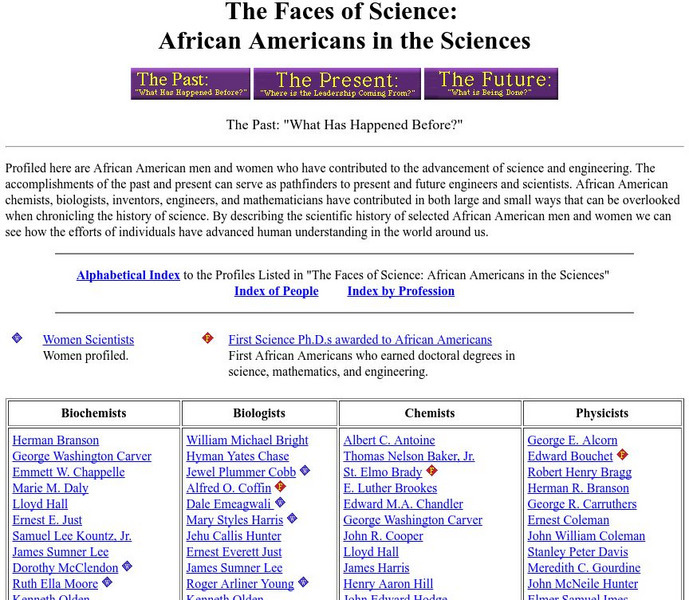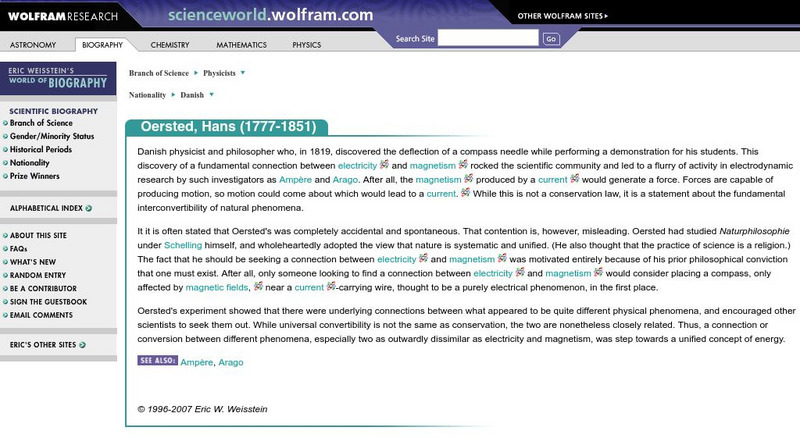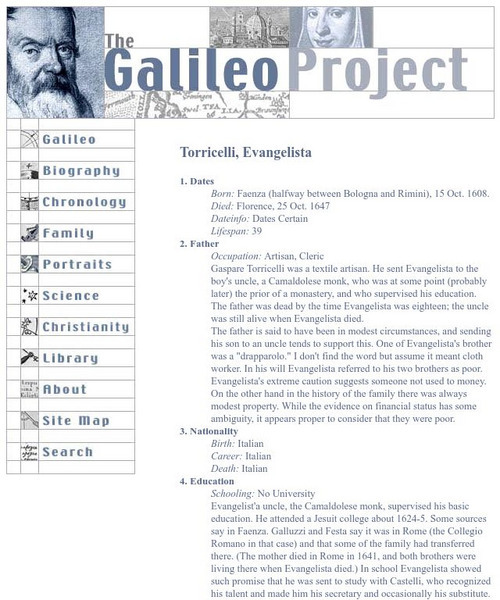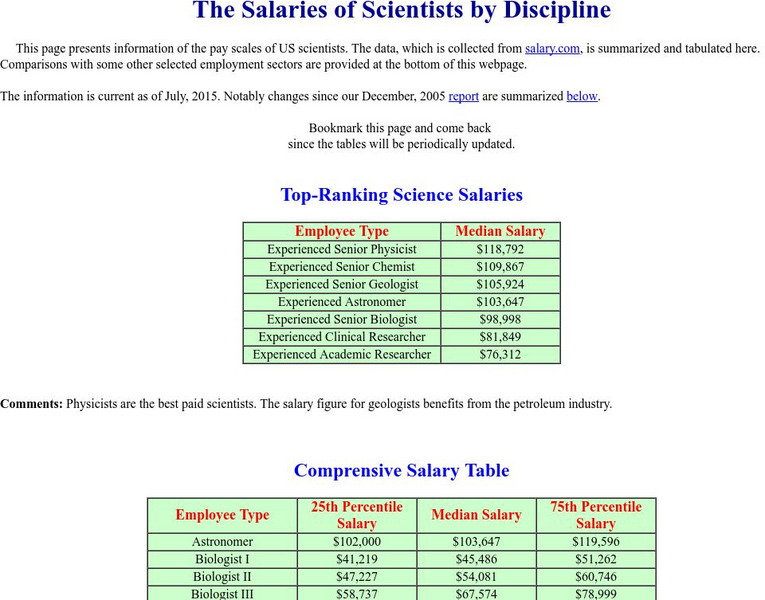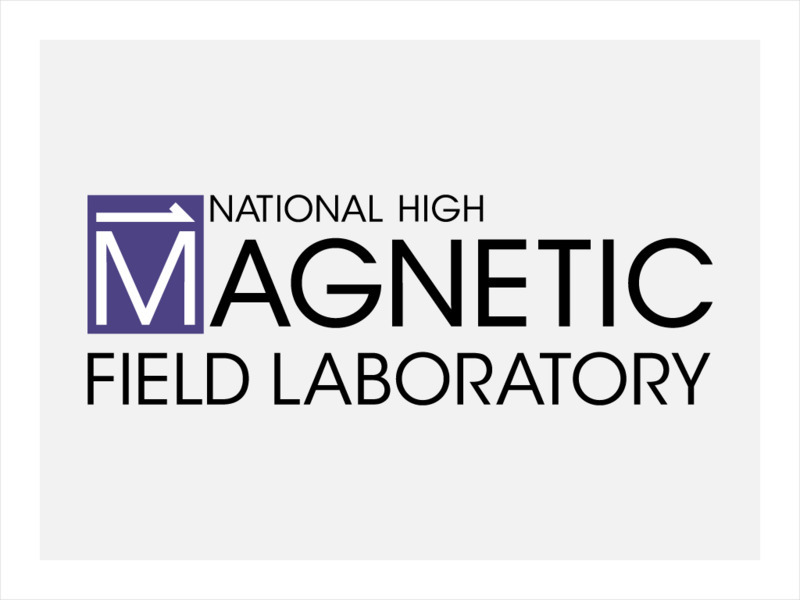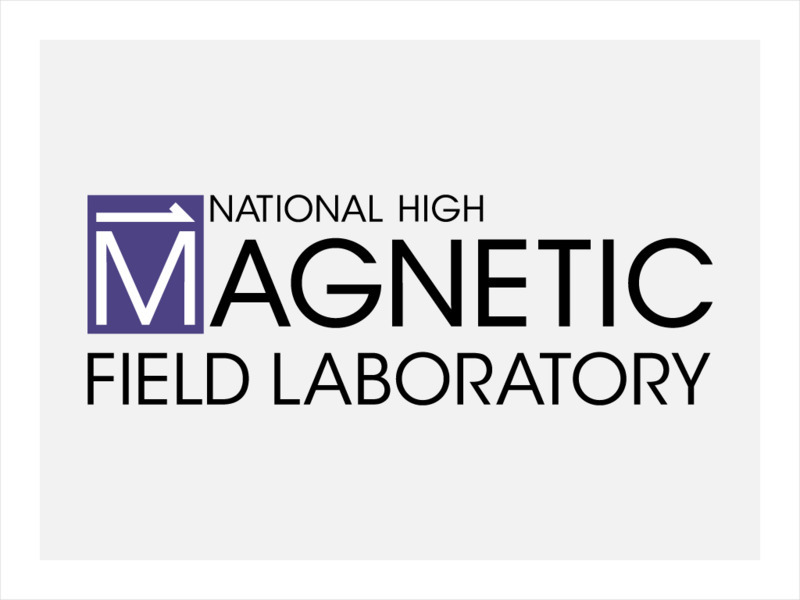Famous Scientists
Famous Scientists: Erwin Schrodinger
Learn about the life and work of this Austrian physicist and theoretical biologist, founder of quantum mechanics, the Schrodinger equation, and his brilliant contributions to the wave theory of matter.
University of California
Princeton University: The Faces of Science: African Americans
This resource explores the role of African Americans in science. Past contributions, present activity and future possibilities are all discussed.
BBC
Bbc Mundo: El Ano Magico De Einstein
A special feature on Einstein from the BBC, in Spanish. Follow Einstein's life, including his role in the development of the atomic bomb; learn about the impact and practical applications of his work; or watch a speech he gave in 1950...
Florida State University
Florida State University: Science, Optics & You: Nicolaus Copernicus
Biography of Nicolaus Copernicus (1473-1543), the scientist who first put forward the theory that the Sun was the center of the universe.
Wolfram Research
Wolfram Science World: Hans Oersted (1777 1851)
A solid telling of Oersted's scientific achievements, along with some interesting insight into Oersted's personal beliefs. Many links.
Rice University
Galileo Project: Evangelista Torricelli
The Galileo Project fact sheet profiles the life and work of Evangelista Torricelli (1608-1647), the Italian scientist and inventor.
University of California
Ucla: Maria Goeppert Mayer
UCLA Physics presents three documents here on Maria Goeppert Mayer, including a brief biography, a longer biography, and a physics meeting address on Mayer and the specifics of her work in nuclear physics.
Wikimedia
Wikipedia: Isaac Newton
In the Spanish langauge, discover the life and works of Isaac Newton. This site highlights his work and also provides links to obtain a greater understanding of these individual works.
Wikimedia
Wikipedia: Marie Curie
This site, which happens to be in Spanish, probes into the life and works of Marie Curie. Discover her accomplishments and how they impacted society.
Wikimedia
Wikipedia: Max Planck
Discover the life and accomplishments of the great German scientist Max Planck. This site also provides links to sites explaining theories and scientific terms that are associated with Planck.
Other
Finding Dulcinea: Marie Curie
Article on Marie Curie, who won two Nobel Prizes in Physics and Chemistry for her discoveries in radioactivity and radioactive elements.
Federation of American Scientists
Fas: Memorial Tribute for Luis W. Alvarez
Read a tribute to Hispanic-American scientist and Nobel Peace prize winner, Luis Alvarez by a fellow scientist. He gives a very detailed account of his life.
Other
Jupiter Scientific: Salaries of Scientists by Discipline
Are you interested in exploring a career in science? Investigate the pay scales of scientists by discipline.
Science Museum, London
Science Museum: Online Stuff: Marie Curie and the History of Radioactivity
Read about Nobel Prize winner, Marie Curie's life, and her historical work with radioactivity.
University of California
Ucla: Contributions of 20th Century Women to Physics
Read about women who made important contributions to physics between 1898-1998. Click on the names to read biographical information about each featured woman.
Florida State University
Florida State University: Magnet Lab: Timeline of Electricity and Magnetism: 1750 1774
With his famous kite experiment and other forays into science, Benjamin Franklin advances knowledge of electricity, inspiring his English friend Joseph Priestley to do the same.
National High Magnetic Field Laboratory
Magnet Academy: Gerd Binnig
Gerd Binnig co-developed the scanning tunneling microscope (STM) with Heinrich Rohrer. The STM allowed scientists entry into the atomic world in a new way and was a major advance in the field of nanotechnology. For their achievement,...
National High Magnetic Field Laboratory
Magnet Academy: Georg Bednorz
J. Georg Bednorz jointly revolutionized superconductivity research with K. Alex Muller by discovering an entirely new class of superconductors, often referred to as high-temperature superconductors. They managed to achieve...
National High Magnetic Field Laboratory
Magnet Academy: Joseph Henry
Joseph Henry was an American scientist who pioneered the construction of strong, practical electromagnets and built one of the first electromagnetic motors. During his experiments with electromagnetism, Henry discovered the property of...
National High Magnetic Field Laboratory
Magnet Academy: Jack Kilby
The integrated circuit fueled the rise of microelectronics in the latter half of the twentieth century and paved the way for the Information Age. An American engineer, Jack Kilby, invented the integrated circuit in 1958, shortly after he...
National High Magnetic Field Laboratory
Magnet Academy: James Joule
James Prescott Joule experimented with engines, electricity and heat throughout his life. Joule's findings resulted in his development of the mechanical theory of heat and Joule's law, which quantitatively describes the rate at which...
National High Magnetic Field Laboratory
Magnet Academy: Karl Jansky
Karl Jansky discovered extraterrestrial radio waves while investigating possible sources of interference in shortwave radio communications across the Atlantic for Bell Laboratories, and is often known as the father of radio astronomy....
National High Magnetic Field Laboratory
Magnet Academy: Hans Christian Orsted
A discovery by Hans Christian Orsted forever changed the way scientists think about electricity and magnetism. While preparing to perform an experiment during a lecture at the University of Copenhagen, he found that the magnetized needle...
National High Magnetic Field Laboratory
Magnet Academy: James Clerk Maxwell
James Clerk Maxwell was one of the most influential scientists of the nineteenth century. His theoretical work on electromagnetism and light largely determined the direction that physics would take in the early twentieth century. Indeed,...



